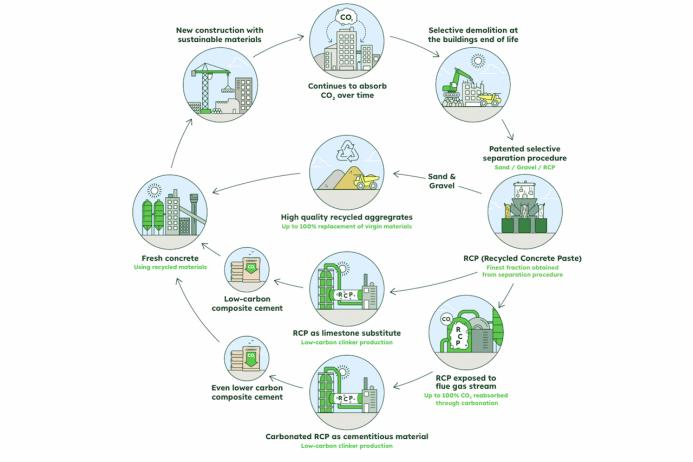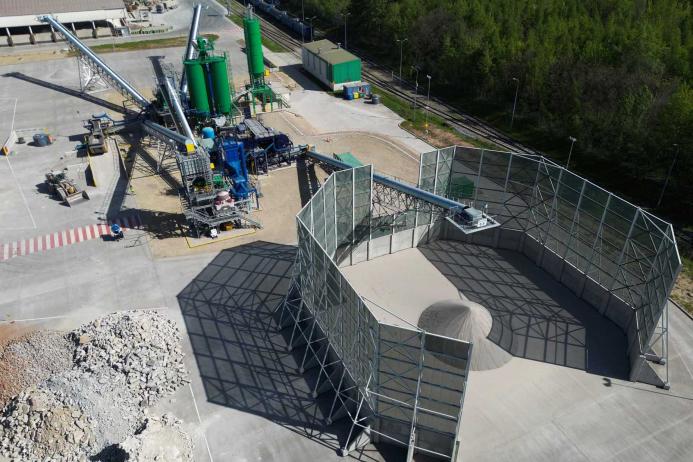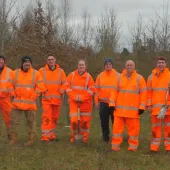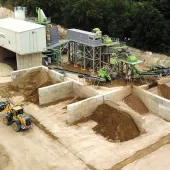Heidelberg Materials close the loop in Poland
Company inaugurates first‐of‐its‐kind recycling plant for selective separation of demolition concrete
HEIDELBERG Materials have commissioned an innovative recycling plant for selective separation at their production site near Katowice, in Poland. The first‐of‐its‐kind facility features a proprietary crushing mechanism that enables sophisticated separation and sorting capabilities to fully recycle demolition concrete and substitute virgin materials in concrete production.
With a capacity of up to 100 tonnes of concrete per hour, Heidelberg Materials say they are the first company in the industry to introduce high‐quality, selective concrete separation at this scale.
Nicola Kimm, chief sustainability officer and member of the managing board of Heidelberg Materials, said: ‘Thanks to our strong commitment to continuous innovation, we are now introducing a revolutionary and commercially viable technology combining circularity with decarbonization on our path to net zero. Innovations like these help to accelerate our transformation and highlight our ambition to close the loop and offer circular alternatives for 50% of our concrete products by 2030.’
‘With our award‐winning ReConcrete approach, we have already shown on a pilot scale that concrete can be fully recycled without loss of quality,’ said Jon Morrish, member of the managing board of Heidelberg Materials and head of Group area Europe. ‘Our new recycling plant marks an important milestone of implementing this innovative technology on a completely new scale, reinforcing our industry‐leading position in driving circularity.’
As part of the company’s patented ReConcrete process, demolition concrete is broken down into its original constituents through a newly designed, proprietary crushing mechanism. The fractions obtained include sand and gravel of the highest quality, equivalent to virgin raw materials. Recycled concrete paste (RCP) is the finest fraction of the separation process: It can be used either as an alternative raw material for clinker production, replacing limestone and reducing CO2 emissions, or as a secondary cementitious material.
In addition, RCP can act as a carbon sink, absorbing and permanently binding CO2 over the entire lifespan of an infrastructure or building project. To make use of this potential and initiate what is known as ‘enforced carbonation’, the RCP can also be exposed to raw exhaust gases from cement production. The resulting carbonated RCP (cRCP) has the potential to mineralize about 150kg of CO2 per tonne of RCP, significantly reducing CO2 process emissions caused by carbon‐intensive clinker production. At the same time, the cRCP can be used as a low‐carbon cementitious material by reducing the amount of clinker necessary.

To further explore this technology, Heidelberg Materials are currently building an industrial pilot facility for enforced carbonation at their cement plant in Górażdże, Poland. The RCP obtained at the recycling plant near Katowice will be transported to the pilot facility in Górażdże, where it will be exposed to the exhaust gases from the kiln. Mechanical completion of the facility is expected by the end of 2024.
In order to meet the growing demand for sustainable building materials, Heidelberg Materials are continuously investing in infrastructure and technologies that pave the way to a circular economy as part of their portfolio optimization. The company recently announced the acquisition of B&A Group, one of the leading construction soil and aggregates recycling companies in South West England specialised in the supply of recycled and primary aggregates as well as site clearance, earthworks, land remediation, and sustainable land regeneration.
Other Heidelberg Materials acquisitions in the field of recycling include Mick George Group (UK), Highway Materials, Aaron Materials, Green Drop Rock Products, and RMS Gravel Inc. (all in the US), as well as RWG and SER Group (both in Germany), which help further expand the company’s presence in core markets while strengthening its range of circular materials.










